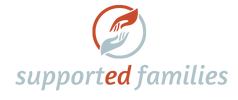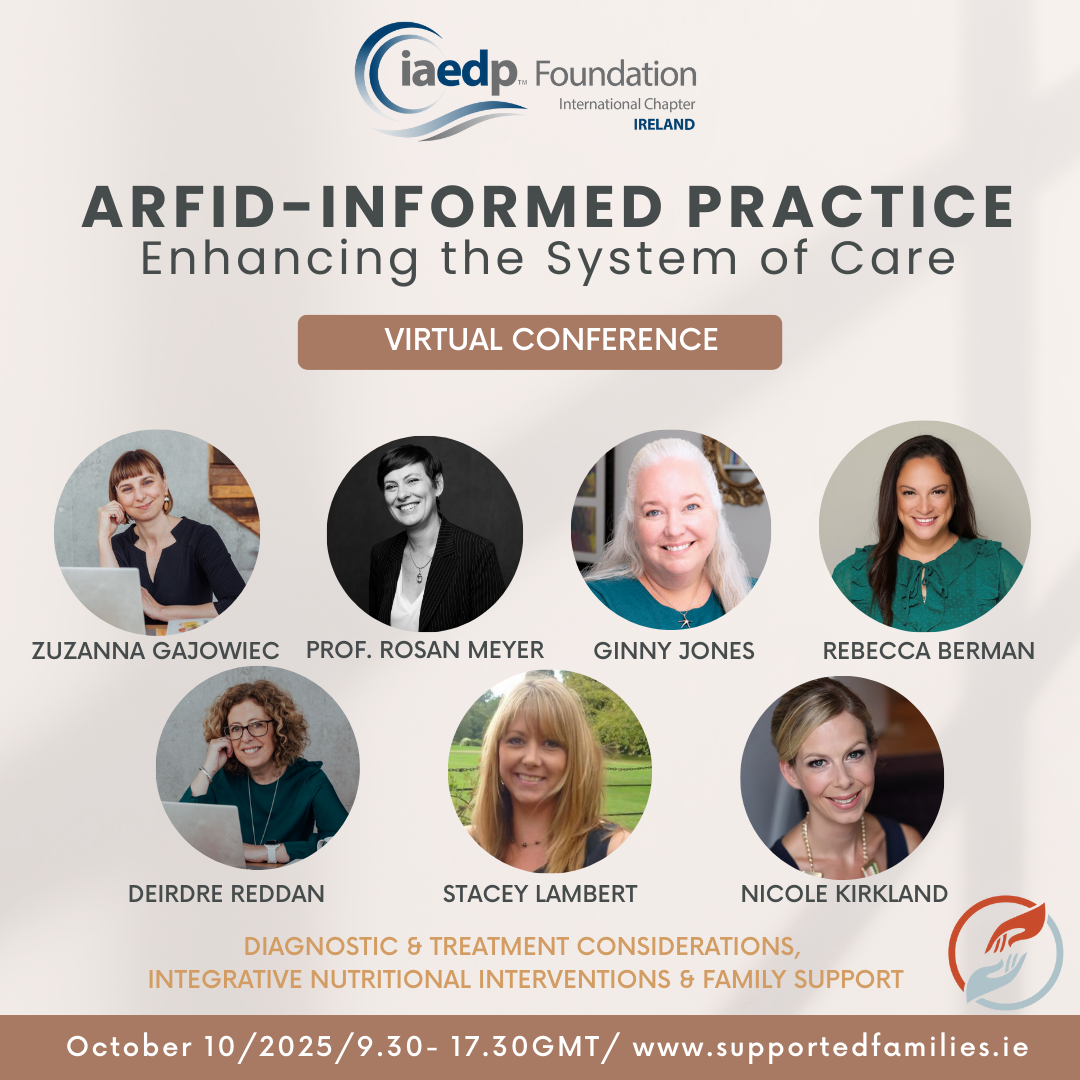Irish iaedp™ chapter International Training Day online CONFERENCE
“ARFID-Informed Practice: Enhancing the System of Care Conference”
organized by Chapter Chair Zuzanna Gajowiec CEDS-C
International Association of Eating Disorders Professionals (iaedp™), established in 1985 is today well recognized for its excellence in providing first-quality education and high-level training standards to an international multidisciplinary group of various healthcare treatment providers and helping professions, who treat the full spectrum of eating disorder problems.
iaedp offers a highly respected certification process for those who wish to receive specialized credentials in their work with people with eating disorders and publishes The Eating Disorders Review, an online professional journal, which addresses contemporary treatment issues. Read the Eating Disorders Review here (https://eatingdisordersreview.com/)
ARFID-Informed Practice: Enhancing the System of Care Conference
Diagnostic and treatment considerations; Integrative Nutritional Interventions & Family Support.
Avoidant/Restrictive Food Intake Disorder (ARFID) is often mistaken for picky eating or a temporary phase. However, ARFID is a serious eating disorder characterized by an ongoing failure to meet nutritional or energy needs due to extreme food restriction or avoidance. ARFID can significantly impact physical health, emotional well-being, and daily life. Unlike other eating disorders, ARFID is not driven by body image concerns or a desire to lose weight.
For many neurodiverse individuals—such as those with autism, ADHD, or sensory processing differences—ARFID is closely tied to sensory sensitivities, executive functioning challenges, and heightened anxiety. Providing effective support requires a neurodiverse-affirming approach that acknowledges these complexities and tailors interventions accordingly.
Date: 10.10.25
online (on zoom) 9.30am – 17.30pm
ARFID-Informed Practice: Enhancing the System of Care Conference is designed to deepen your understanding and enhance your approach to screening, assessment, and treatment of ARFID within a multidisciplinary system of care.
Key Topics:
- Latest research and guidelines on ARFID
- Screening and assessment tools for accurate diagnosis
- Overcoming diagnostic challenges and dilemmas
- Evidence-based treatment approaches and interventions
- Integrative Nutritional Interventions
- SPACE-ARFID: An Introduction of the model
- Collaborative care strategies to improve patient outcomes
- Family Considerations
Join leading experts, connect with fellow professionals, and expand your knowledge to better support individuals with ARFID. Don’t miss this opportunity to enhance your practice and contribute to the evolving system of care!
Conference Program:
9:15 am – Registration & Welcome
9.30. – 9.45 – Welcome and Opening Remarks by Zuzanna Gajowiec
9.50 – 10.50 am Session 1 –- Exploring ARFID through a Neurodiverse-Affirming Lens: Guidelines for Assessment, Diagnostic Challenges, and Treatment Considerations by Zuzanna Gajowiec
10:50 am – 11:10 am Break 1
11:10 am – 12:30 pm Session 2 – Nutritional Interventions – Prof. Rosan Meyer
12:30 pm – 13:15 pm Break 2
13:15 pm – 14:30 pm Session 3 – SPACE-ARFID: An Introduction of the model for parents and clinicians.
14.30 pm – 14.50pm – Break 3
14.50 – 16.00pm Session 4 – Alphabet Soup: A Recipe for Treating ARFID Utilizing ERP (Exposure and Response Prevention) by Rebecca Berman
16.00 – 16.15 – Break
16.15 – 17.20 Session 5 – Family Perspective Panel – Deirdre Reddan, Nicole Kirkland and Stacey Lambert
17.20 – 17.30 Closing Remarks
Details:
- Session 1 –- Exploring ARFID through a Neurodiverse-Affirming Lens: Guidelines for Assessment, Diagnostic Challenges, and Treatment Considerations by Zuzanna Gajowiec
Participants will learn:
- Use Assessment Tools and describe at least 2 differences between ARFID and Anorexia Nervosa
- List the subcategories for ARFID and understand where they may overlap
- List at least 3 Neurodiverse-Affirming treatment adaptations for each subtype of ARFID that can be applied within the scope of care
- Session 2 – The challenge of achieving nutritional requirements in children with ARFID – Prof. Rosan Meyer
In this presentation Rosan will cover the common dietary patterns seen in children with ARFID and nutritional deficiencies. The presentation will also include practical dietary management tips and options for achieving vitamin and mineral requirements, which can be very challenging with sensory specificities.
- Session 3 – SPACE-ARFID: An Introduction of the model for parents and clinicians.
Discover how Supportive Parenting for Anxious Childhood Emotions (SPACE) empowers parents as key figures in eating disorder treatment and recovery. Learn about anxiety accommodation and the SPACE treatment model, with insights from clinical study outcomes. Explore the adaptation of SPACE for kids with Avoidant/Restrictive Food Intake Disorder (ARFID), understanding how anxiety fuels and sustains disordered eating behaviors. Gain practical ideas on implementing SPACE-ARFID in the home, alongside real-life success stories of families integrating this approach with Family-Based Treatment (FBT) and other eating disorder therapies. Find out how you can receive training in SPACE-ARFID. This presentation caters to both professionals and parents seeking to support children with eating disorders.
- Introduction to Supportive Parenting for Anxious Childhood Emotions (SPACE)
- why parents are the key to anxiety disorder treatment and recovery
- about anxiety accommodation and how it maintains disordered behavior
- the SPACE treatment model
- clinical study outcomes
- Explanation of how SPACE was adjusted and tested in kids with ARFID
- how anxiety contributes to and maintains disordered eating
- adjustments to the SPACE model for ARFID
- clinical study outcomes
- Ideas for how parents can use SPACE-ARFID when kids have eating disorders
- accommodations/maintaining factors of eating disorders
- real-life examples of families using SPACE with FBT and other eating disorder treatment
- How you can get trained in SPACE-ARFID
- professional resources
- parent resources
- Session 4 – Alphabet Soup: A Recipe for Treating ARFID Utilizing ERP (Exposure and Response Prevention) by Rebecca Berman
Objectives:
- Participants will identify three subtypes of ARFID.
- Participants will identify key components of setting up quality exposure.
- Participants will be able to identify hidden compulsions including avoidance, thought suppression, and mental rituals associated with ARFID.
15.50 – 16.00 – Break
16.00 – 17.00 Session 5 – Family Perspective Panel – Deirdre Reddan, Nicole Kirkland and Stacey Lambert
17.00 – 17.30 Q&A and Closing Remarks
Our speakers:
- Zuzanna Gajowiec – Zuzanna Gajowiec is a highly respected Certified Eating Disorder Specialist and Consultant (CEDS-C) with a profound dedication to supporting individuals and families on their journey towards healing and recovery. As the International Association of Eating Disorder Professionals (iaedp) Chapter Chair of Ireland, Zuzanna is at the forefront of advancing awareness and understanding of eating disorders in her community. With over a decade of experience in the field, Zuzanna has worked tirelessly across all levels of care, from residential treatment centers to outpatient settings and private practice.
- Prof. Rosan Meyer – Specialist Paediatric Dietitian; Rosan is currently visiting Professor at KU Leuven, on their MSc on Deglutology and leads the ARFID course at University of Winchester. She is a paediatric dietitian with previous appointments at Imperial College London and Great Ormond Street Hospital for sick children. Her practice in London focuses on food hypersensitivity and the spectrum of feeding difficulties and ARFID. She is actively involved in multiple research projects including an NIHR funded study in food allergy and supports several research projects on the topic of ARFID.
- Ginny Jones is a parent coach specializing in eating disorders and the founder of More-Love.org, an online resource that supports parents who have kids with eating disorders. She helps parents understand what’s really going on with their kids’ eating behaviors and teaches them the science-backed skills to heal kids’ relationship with food, improve their body image, and feel more secure, confident, and connected to themselves, their parents, families, and others.
In addition to publishing hundreds of articles and resources for parents, she’s the author of several eBooks, printable worksheets, and online courses to help parents support kids’ body image, eating, and emotional regulation.
Ginny has spent more than a decade immersed in child psychology, neurobiology, parenting, mental health, and eating disorders and is currently pursuing a master’s degree in Family Therapy. Her unique approach is based on lived experience, research, training, and interviews with hundreds of professionals, people who have/had eating disorders, and parents. She has training in FBT, SPACE, sDOR, and IFS, and more.
- Rebecca Berman – LCSW, MLSP, CEDS-C (she/her) is a nationally recognized speaker and
specializes in treating and presenting on eating disorders, OCD, anxiety, trauma, and
neurodiversity. Rebecca is the Clinical Director of Anxiety Institute in McLean, VA. She co-authored The Renfrew Unified Treatment for Eating Disorders and Comorbidity – An Adaptation of the Unified Protocol, published by Oxford University Press in 2021. Rebecca has been motivated to research, develop, and implement cutting-edge transdiagnostic treatment practices using the unified protocol, cognitive processing therapy, and cognitive behavioral therapy for ARFID. She is passionate about adapting treatment modalities to meet the needs of neurodiverse individuals.
- Deirdre Reddan is a Parent Coach and Mentor, specialising in eating disorders. She is the co-founder of Supported Families (with Zuzanna) (Home – Supported Families). Supported Families educate, equip and empower parents, partners and professionals in eating disorder recovery. She is also an associate instructor with Youth Mental Health First Aid Ireland. A former banker, Deirdre came to this field after supporting her own child’s recovery.
Who can benefit from this conference?
This conference will be of interest to all eating disorder professionals:
- Psychologists
- Dietitians
- Nutritionists
- Psychotherapists
- Nurses
- Doctors
- Coaches
- Experts by experience working in the field
- People in recovery from an eating disorder
- Family members and carers supporting someone with an eating disorder

